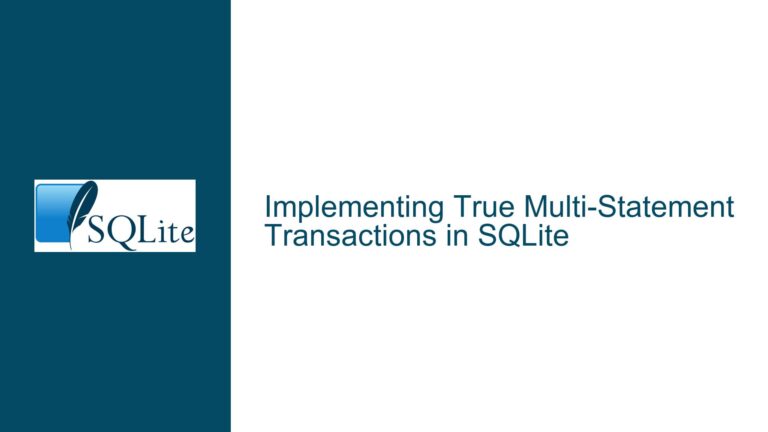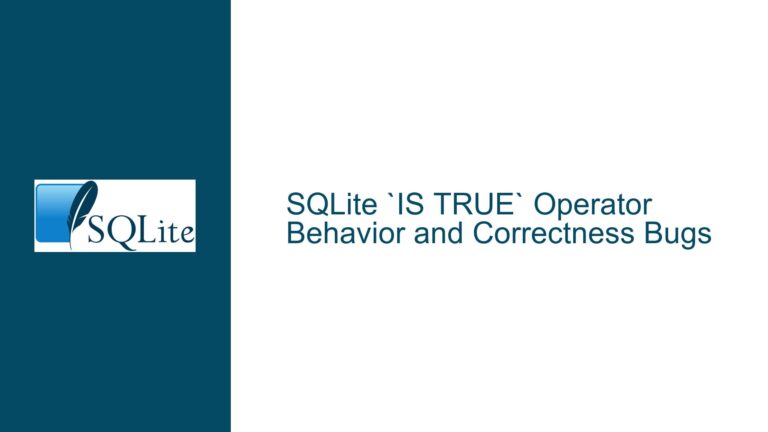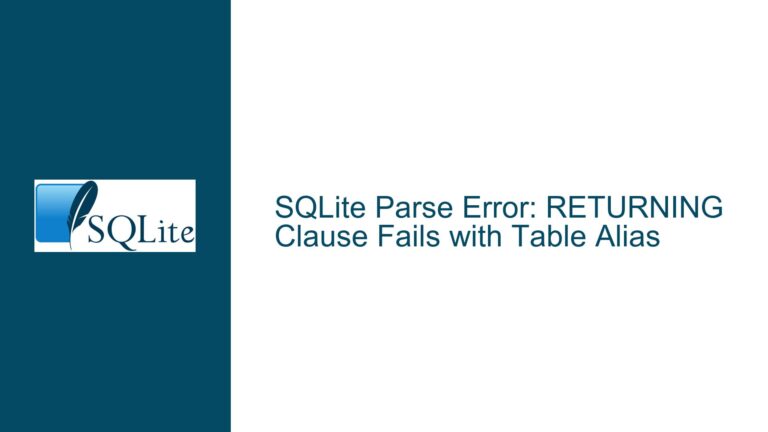Assertion Failure in sqlite3FindInIndex Due to IndexedExpr Optimization
Issue Overview: Assertion Failure in sqlite3FindInIndex Function During Query Execution
The core issue revolves around an assertion failure in the sqlite3FindInIndex function within SQLite, specifically when executing a complex query involving a JOIN, GROUP BY, and a nested SELECT with a COLLATE NOCASE clause. The assertion failure occurs due to an internal check in SQLite that ensures certain conditions are met during query execution. The assertion pReq!=0 || pRhs->iColumn==XN_ROWID || pParse->nErr fails, indicating that the query optimizer or execution engine encountered an unexpected state.
The query in question involves creating a table v0 with a single column c0, followed by the creation of an index i on v0 with a compound expression involving c0 and +c0 COLLATE NOCASE. The subsequent SELECT statement performs a self-join on v0, groups the results by a0.c0, and includes a HAVING clause with a nested subquery. The subquery itself contains an IN clause with a COLLATE NOCASE modifier, which appears to be a critical factor in triggering the assertion failure.
The issue is reproducible with SQLite version 0421cc03e0efa8f1 and is linked to a specific optimization flag, SQLITE_IndexedExpr. Disabling this optimization (SQLITE_IndexedExpr) resolves the issue, suggesting that the optimization is either incorrectly applied or incompatible with the query structure. The bug was introduced in a specific commit range, as identified by bisecting, and was later fixed in commit 2b23dd249d0bc254.
Possible Causes: Misapplication of SQLITE_IndexedExpr Optimization in Complex Query Contexts
The assertion failure in sqlite3FindInIndex is likely caused by the misapplication or incorrect handling of the SQLITE_IndexedExpr optimization in the context of a complex query involving collations and nested subqueries. The SQLITE_IndexedExpr optimization is designed to improve query performance by precomputing expressions that can be indexed. However, in this case, the optimization appears to conflict with the query’s structure, particularly the use of COLLATE NOCASE and the nested IN clause.
The COLLATE NOCASE modifier introduces a case-insensitive comparison, which may not be fully compatible with the SQLITE_IndexedExpr optimization. The optimization might assume that the indexed expressions are deterministic and do not involve collations, leading to incorrect assumptions during query planning or execution. This mismatch could result in the assertion failure when the query engine attempts to resolve the indexed expression in the context of the nested subquery.
Additionally, the query’s use of a self-join and GROUP BY clause adds further complexity. The query planner might generate an execution plan that incorrectly applies the SQLITE_IndexedExpr optimization to the HAVING clause or the nested subquery, leading to an invalid state. The assertion failure indicates that the query engine expected certain conditions to be true (e.g., pReq!=0 or pRhs->iColumn==XN_ROWID), but these conditions were not met due to the optimization’s misapplication.
The issue is further compounded by the specific compilation flags used, such as SQLITE_DEBUG, SQLITE_ENABLE_TREETRACE, and SQLITE_ENABLE_WHERETRACE, which enable additional debugging and tracing features. These flags might expose edge cases or inconsistencies in the query engine’s behavior, particularly when optimizations like SQLITE_IndexedExpr are involved.
Troubleshooting Steps, Solutions & Fixes: Identifying and Resolving the Assertion Failure
To address the assertion failure in sqlite3FindInIndex, follow these detailed troubleshooting steps and solutions:
Step 1: Verify SQLite Version and Compilation Flags
Ensure that the SQLite version being used is either the latest stable release or a version that includes the fix for this issue (commit 2b23dd249d0bc254 or later). If upgrading is not immediately feasible, review the compilation flags to determine if any optimizations or debugging features might be contributing to the issue. Specifically, check if SQLITE_IndexedExpr is enabled and consider disabling it temporarily to verify if the issue persists.
Step 2: Disable SQLITE_IndexedExpr Optimization
If the issue is reproducible, disable the SQLITE_IndexedExpr optimization using the .testctrl optimizations 0x01000000 command. This command disables the specific optimization flag responsible for the assertion failure. After disabling the optimization, re-run the query to confirm that the issue is resolved. If the query executes successfully, this confirms that the SQLITE_IndexedExpr optimization is the root cause.
Step 3: Analyze Query Structure and Collation Usage
Review the query structure to identify any elements that might conflict with the SQLITE_IndexedExpr optimization. Pay particular attention to the use of COLLATE NOCASE and nested subqueries. Consider rewriting the query to avoid unnecessary complexity or to explicitly handle collations in a way that is compatible with the optimization. For example, you might precompute the case-insensitive comparison in a separate step or use a different approach to achieve the same result.
Step 4: Apply the Fix from Commit 2b23dd249d0bc254
If upgrading SQLite is an option, apply the fix from commit 2b23dd249d0bc254. This commit addresses the specific issue with the SQLITE_IndexedExpr optimization and ensures that it is correctly applied in the context of complex queries involving collations and nested subqueries. After applying the fix, re-run the query to verify that the assertion failure no longer occurs.
Step 5: Monitor Query Performance and Optimizations
After resolving the issue, monitor the query’s performance to ensure that the SQLITE_IndexedExpr optimization is providing the expected benefits. If disabling the optimization results in a significant performance degradation, consider alternative approaches to optimize the query, such as restructuring the schema, creating additional indexes, or using different SQL constructs.
Step 6: Report the Issue and Contribute to the Community
If the issue persists or if you identify additional edge cases, consider reporting the issue to the SQLite development team. Provide detailed information about the query, the SQLite version, the compilation flags, and the steps to reproduce the issue. Contributing to the community by sharing your findings and solutions can help improve SQLite’s robustness and prevent similar issues in the future.
By following these steps, you can effectively troubleshoot and resolve the assertion failure in sqlite3FindInIndex while ensuring that your queries remain performant and reliable. The key is to carefully analyze the query structure, understand the impact of optimizations like SQLITE_IndexedExpr, and apply the appropriate fixes or workarounds to achieve the desired results.






